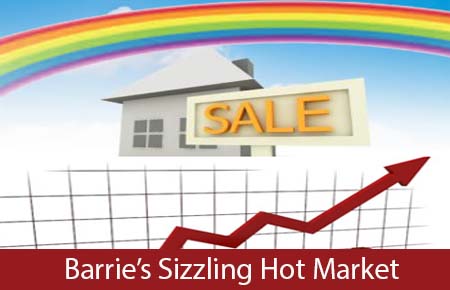Barrie Real Estate News
Barrie Real Estate prices show no signs of stopping their steady growth. According to statistics from the Barrie and District Association of Realtors, sales tumbled 55 per cent in April compared to the previous year, but housing prices are up. The average detached house price rose six per cent to an average of roughly $580,000. This is mainly due to demand holding steady across the region as many homebuyers choose Barrie as their new home.
Residential property sales recorded through the Matrix™ System in the Barrie & District Association of REALTORS® Inc. region numbered 764 units in July 2020. This was a increase of over 52% from July 2019. This was also a new record for the month of July and was the highest level in history.
The Barrie and District Association of Realtors’ latest statistical update shows the market is rebounding and showing “strong” growth after COVID-19 stopped all but a handful of emergency sales in early spring. In June, there were 400 units sold in Simcoe County, excluding Barrie. That’s a 71.7 per cent increase in sales compared to May. The incredible strength in activity has not been matched by the return of new supply, so buyers are looking at the tightest market of the past decade. As a result, the number of available listings is shrinking, and housing prices are reaching record levels.”
Although Barrie’s Real Estate is booming, so are the local areas of: Angus, Innisfil, Midland, Orillia, Wasaga Beach and Alliston. Last month, year-over-year housing prices were up 7.7% in the Greater Barrie Area, 1.5% in Southern Georgian Bay and 5.1% in Orillia and Area. This increase in sales activity is hard on Home Buyers as there are many properties that are selling with Multiple Offers and Restricted Conditions. Many buyers are waiving their Home Inspection in order to secure their purchase by making their offer more attractive to the seller. Waiving your Home Inspection could be compared to going to a Casino.
Barrie Real Estate Condo News
 In July total condominium units sold in Barrie started to level off, there were 50 condominiums sold in the last month; 33 condo apartments and 17 condo townhouses.
In July total condominium units sold in Barrie started to level off, there were 50 condominiums sold in the last month; 33 condo apartments and 17 condo townhouses.
Condominum sales did not double as in previous month but prices continued to increase as demand still exceeded existing supply.
The average sale price for a condo apartment increased 31% from June with the median increase of 24%. Units were selling for 99% of their original list price in an average of 26 days.
Condo townhouses also saw an increase from June to July. The average sale price rose by 3% with a new average sale price of $374,459. Units were selling in an average of 20 days for 100% of the original list price.
The overall condominium market in Barrie is up 10% from July 2019 where units are selling in less days and closer to the seller’s asking price.
Real Estate & Covid-19
Canada’s private real estate market is roaring again after it briefly froze up because of COVID-19. Its stock market equivalent isn’t keeping pace.
Home sales and prices in the nation’s biggest cities have rebounded sharply. In greater Toronto, the average selling price of homes jumped almost 17 per cent in July over the previous year. A national home price index rose 7.4 per cent.
Investors who are getting their property exposure through equities, on the other hand, are having a dreadful time. The iShares S&P/TSX Capped REIT ETF, trading under the ticker XRE, is down 23 per cent this year, excluding dividends, underperforming its U.S. and global equivalents. The Canadian ETF is on pace for its worst year since the 2008 global financial crisis.
It’s a story of too much exposure in the wrong places. Canada’s commercial real estate sector boomed in the decade after the financial crisis, as global investors bid up urban office buildings and strong consumer spending made shopping centers valuable.
The coronavirus pandemic reversed the outlook for both office and retail, causing heavy losses for large Canadian REITs including RioCan Real Estate Investment Trust, Cominar REIT and H&R REIT.
Types of Defects in Home
Patent Defect
A patent defect is one that is clearly visible, such as a crack in the window or a missing handrail. You don’t have to disclose patent defects to prospective buyers since these flaws can be easily seen during a home inspection.
Latent Defect
A latent defect, on the other hand, is one that is not noticeable and may even be hidden behind walls or under floors. Sometimes home inspectors might not even be able to discover issues. As a seller, you are required by law to disclose any known latent defects that could make your home dangerous or unfit for habitation. Examples of latent defects could include a basement that floods during heavy rainfalls, a structural problem with a wall or a chronic mould outbreak. If a seller knows about a latent defect that makes the home dangerous or unfit for habitation and fails to disclose it, they put themselves at risk of being sued by the buyer.
In Ontario, the SPIS form will list a number of items that sellers should disclose. Many Ontario Real Estate Boards have discontinued the use of the SPIS form due to the high number of law suits regarding disclosure of Defects.
Once you have possession of your Home and you discover any Major Defects, your only recourse is to sue the seller. Your Realtor typically does not provide any assisstance in these issues. Your only protection, other than lawyers, is your Home Inspector. As a Buyer you have to option of “Rolling the Dice”, just be aware you are the only one with money riding on that “Role of the Dice”

